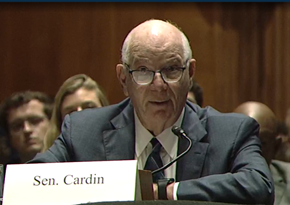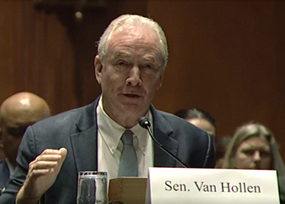Van Hollen, Cardin Urge EPW Committee Leaders to Move Forward Legislation to Confirm Full Federal Coverage for Replacing the Francis Scott Key Bridge
Based on precedent alone, the massive scope and scale of this tragedy warrants a full federal response
U.S. Senators Ben Cardin and Chris Van Hollen (Both D-Md.) today pressed the leadership of the Senate Environment and Public Works Committee (EPW) to move forward legislation that would confirm the federal government would cover 100 percent of the cost to replace the Francis Scott Key Bridge, which collapsed in March. At an EPW hearing today, led by Chair Tom Carper (D-Del.) and Ranking Member Shelley Moore Capito (R-W.Va.), Cardin and Van Hollen were direct in their calls for passage of their Baltimore BRIDGE Relief Act with the first available legislation moving through the Senate.
Senator Cardin’s opening statement can be found at this link. Senator Van Hollen’s opening statement can be found at this link. The full hearing can be found here.
“For 47 years, the Key Bridge has stood as an iconic symbol in Baltimore – as well as a vital transportation artery for the region and the gateway to the Port of Baltimore. Its collapse shook the world, and it was a tragedy for our country, our state, and most of all, the families who lost loved ones. Senator Cardin and I introduced the bipartisan Baltimore BRIDGE Relief Act with the Maryland delegation to uphold the tradition of providing 100% federal support for states that have undergone this kind of tragedy. We have been there for other states during their times of need, and we’re urging our colleagues in the Senate to stand with us now,” said Senator Van Hollen.
“March 26 was a shock to Maryland and the nation. The loss of life was our major concern. The Port of Baltimore was closed. The entire region – the entire country – was impacted by this tragedy as a major artery for road and water traffic was shut down in seconds,” said Senator Cardin. “It would be a terrible precedent if a state was asked to pay a percentage of the recovery from a disaster of this size. Such a punitive request would never be made of a community hit by a hurricane or wildfire of this magnitude. In the end, in this case, the federal government will be reimbursed at record levels from insurance and other proceeds from responsible parties. We must finalize this federal cost-share now, so that planning and construction of the new bridge can move forward with certainty. Every month of delay is a greater loss to our communities.”
“We are losing revenue now, right, and we will continue to lose that revenue through the next four and half years is what we are projecting right now. So, we are losing those dollars now,” said Maryland Transportation Secretary Paul Wiedefeld. “The other part of that is that we are costing businesses and people every day by the delay of this bridge being built- by any potential delay of this bridge being built. So, all those are added costs that, in effect, we are trying to cover now so that we can get this bridge done as quickly as we can.”
“In the case of a $1.7 billion bridge replacement, with a corresponding loss of toll funding that has impacts on their transportation program, I think that’s where you get into a scope and scale sense of where the federal government may need to come in- because the 10 or 20 percent cost share becomes a quite sizable number at that point,” said Federal Highway Administrator Shailen Bhatt.

